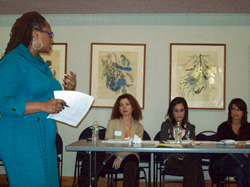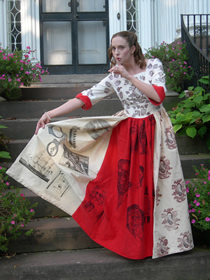Teacher Workshops in Rhode Island
Posted November 22nd, 2010 by Kristin GallasCategory: News and Announcements Tags: Linden Place, Northern slavery, Rhode Island, Tracing Center
 This fall the Tracing Center presented a series of special workshops for Rhode Island educators on the role of the North in slavery.
This fall the Tracing Center presented a series of special workshops for Rhode Island educators on the role of the North in slavery.
The history of Rhode Island’s complicity in slavery and the slave trade has been missing from the state’s classrooms for generations. The Rhode Island Department of Education mandated teaching about the state’s complicity in slavery/slave trade in its Grade Span Expectations (teaching standards) in 2008. Some teachers don’t know the history, other teachers are aware of the historical information, but are unsure how to teach it. The workshops covered content knowledge about Rhode Island’s complicity in slavery and the slave trade, as well as tools for how to effectively and sensitively teach the subject matter to students of all backgrounds. Through our training in content and pedagogy and the written resources provided for them, they returned to their classroom better equipped to teach about slavery and its legacies.
The workshops, held in North Kingstown, Providence, and Bristol, featured a visit to local historic sites that interpret the history of their enslaved residents – Smiths Castle, John Brown House, and Linden Place respectively.
 Workshop presenters included: Professor Joanne Melish, Tulaine Marshall (one of our lead trainers), Morgan Grefe (Rhode Island Historical Society), and Tracing Center staff members Katrina Browne, James Perry, and Kristin Gallas.
Workshop presenters included: Professor Joanne Melish, Tulaine Marshall (one of our lead trainers), Morgan Grefe (Rhode Island Historical Society), and Tracing Center staff members Katrina Browne, James Perry, and Kristin Gallas.
The Bristol workshop also featured a live performance and discussion by Elizabeth Sturges Llerena, who appears in Traces of the Trade and whose artwork exploring slavery and memory was on display at Linden Place.
Comments from workshop participants include:
• “I did not realize before the film the extent to which Rhode Island and families of Rhode Islanders were involved (in the slave trade). I need to do more in my classroom to further the cause for which you are working.”
• “History is about geography and finance; they can create cruelty or kindness; evil or generosity. Human beings have brains and chances. They are ours to exercise and it’s more important that we do so today and train children to do so.”
• “I found the section on pedagogy [tips for teaching about slavery] especially helpful in looking at how to approach controversial issues and facilitate a discussion.”
• “In many ways I came in [to the workshop] feeling confused about the slave trade. I have learned so much today it could take a long time to jot it down. I do know that I leave knowing that I need to read [more about the subject], and now I have the resources to do so. I am excited to use techniques and materials in my integrated arts project. I know that these materials will assist me in showing students how to develop intellectual distance as well as empathy.”
 The workshops were funded through the generous support of the Rhode Island Council for the Humanities.
The workshops were funded through the generous support of the Rhode Island Council for the Humanities.



Leave a Reply